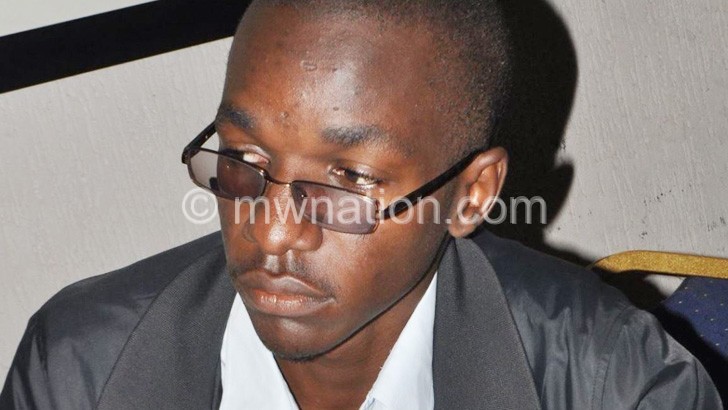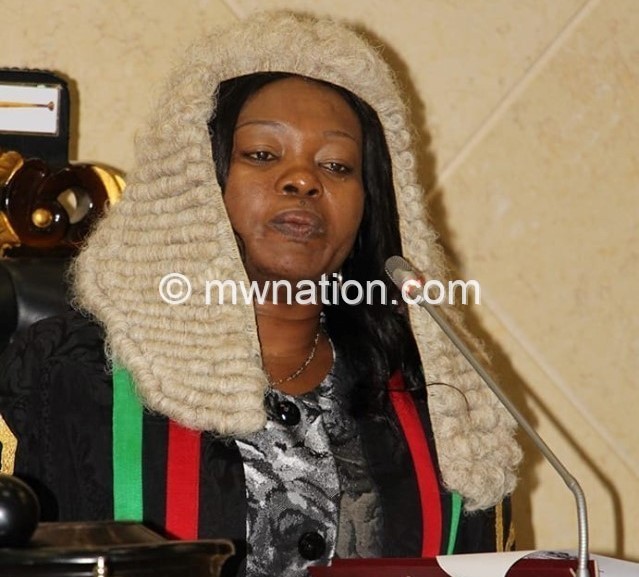On Cabinet, Speaker
On Wednesday, parliamentarians elected Malawi’s first female speaker of the national assembly, MCP’s Mzimba North East parliamentarian Catherine Gotani Hara. That very night, President Peter Mutharika announced a 24-member Cabinet. Our reporters FATSANI GUNYA and AYAMI MKWANDA engaged governance expert Makhumbo Munthali on this and other matters. Excerpts:

On Wednesday Parliament chose Hara as speaker. What do you say?
Hara’s election has sent a strong and positive message in as far as Malawi’s commitment towards ensuring that women take up influential political and public positions as outlined in the Convention for the Elimination of Discrimination Against Women (Cedaw), the Sadc Gender Protocol and African Union Women Protocol is concerned. This is an influential position, as she is the first female of the legislature arm of government. However, while gender considerations are important, we will have to wait to see her performing to the best of her ability.
That same day, President Peter Mutharika announced his cabinet. What was your initial reaction?
While there are some new faces, the Cabinet is largely a complete departure from what the President promised in the 2019 DPP manifesto and the Njamba victory celebration rally. The President promised the best ever development focused Cabinet that would be characterised by inclusivity, merit, and lean Cabinet of 20 amongst other factors. However, the President has not only failed to honour the 20-member Cabinet promise but also failed to ensure there is regional and gender balance in the appointment. For example, the President has failed to adhere to the tenets of the Gender Equality Act, SADC Gender Protocol and AU Women Protocol by appointing 20 per cent of women in Cabinet.

Among others, the DPP has been accused by its critics of practicing politics of nepotism. Would you say there are these traits in cabinet?
On regional balance, Mutharika seems to have given in to the perennial temptation of largely appointing those from his tribe and the Southern Region who voted him in large numbers and punish the North and Centre for rejecting him.While some may argue that Mutharika is justified to do so because he didn’t have many MPs in the North and Centre, it is important to point out that Mutharika was not obliged to appoint only MPs. He would have reached out to other capable individuals outside Parliament across the three regions for such appointment.
Are you therefore implying that the selection was not done on merit?
Certainly, Mutharika’s Cabinet cannot be said to have been meritorious but rather largely based on pursuing appeasement and nepotistic or regionalist goals, and rewarding those who campaigned hard for the party in the election. This is not only seen in Cabinet appointments but also the list of additional advisors to the already long list he has. Certainly, we should expect more of such criteria being evident in the appointment of people into the parastatal boards and foreign missions like embassies.

Of late, there seems to be a trend of appointing deputy ministers and presidential advisors in the country. President Mutharika has also included some in his new cabinet. Is this justified?
As I have always been arguing, we do not need deputy ministers and presidential advisors in this country. To begin with, this is costly and a burden to the shrinking economy. Besides, the full ministers and Principal Secretaries ably cover the roles these positions do. As such, deputy ministers and presidential advisors are unnecessary. Their appointments add no value towards governance growth of this country.
I still maintain that Principal Secretaries of relevant ministries can ably be utilised as technical advisors to the President on matters relating to their particular ministry.
So, there are no positives to the president’s appointments this time around?
Not really. The president should be commended for maintaining some star performers from his previous Cabinet such as Bright Msaka and Joseph Mwanamveka whom in my view have also been rightly placed. However, it is still a missed opportunity for the executive in its attempt to steer the country towards prosperity. Mutharika has stuck to the old script associated with second terms of Presidents in Malawi where appointments are largely based on rewarding patronage, appeasements and pursuing narrow political interests at the expense of public interest . It can be said beyond reasonable doubt that Mutharika’s Cabinet is not inspiring and a missed opportunity to unify the country.
What would you advise the President in his second term?
I think President Mutharika has the past to learn from, and it would be naïve and gullible enough for him to blame anyone for failing to deliver his promises in the second term. However, he will certainly need to be more developmental focused rather than focusing on rewarding patronage, clientelism and nepotism which was associated with his first term. Coming from a controversial and divisive election where 62 percent of total voters did not vote for him, it will be incumbent upon Mutharika to take lead in unifying the country by among other things ensuring that his government sticks to equitable distribution of development across the country, merit based and inclusive public appointments as well as implementing fully the public sector reforms. Most importantly, President Mutharika should not only take lead but also be seen to be fighting corruption in the country mindful of the background that the majority of Malawians were of the view that his government was very corrupt in the first term.
As Parliament is sitting in Lilongwe, what should be the main focus?
This is an interesting sitting of Parliament coming against the background of a controversial election whose outcome continues to be contested by the opposition. Now, with the issue not yet settled by the courts following MCP and UTM petition before it, there is a likelihood of the opposition and DPP MPs to divert from what is on the order paper to talk about the outcome of the elections. All this, coupled by the fact we have an increased number of new MPs we shouldn’t expect much from the early days of Parliament sitting. Nevertheless, the expectation is that our MPs will pay special attention to scrutinising and evaluating government budget performance in the last fiscal year before deliberating on the 2019/2020. This will be crucial in as far as Parliament oversight role is concerned especially coming against the background that during election period huge chunks of public funds and resources are abused for ruling party campaign. Perhaps this is the time President Mutharika as the chief duty bearer- should seriously consider availing himself for question time by MPs as guaranteed by the Constitution to respond to questions on how government performed in the previous – besides the usual Finance Minister and State of National Address statements.
It is clear that some independents have shifted sides. What message are they sending to the electorate and the country?
It’s unfortunate to note that independent MPs continue to ‘cross the floor’ by joining the government or the opposition without the consent of the people who elected them as independents. While the current law on crossing the floor does not apply to independent MPs, this does not reflect well on representative democracy, where the voters often feel duped. History has shown that such decisions are often made not out of their constituents’ interests but rather for selfish gains. Certainly, some of those who have flocked to the government are deliberately doing so in order to position themselves for either ministerial positions as well as other informal incentives that they may get for their association with the government.
How can we overcome this?
I think there is need to amend Section 65 so that it also applies to Independent MPs who ‘cross the floor’. We also need to bring back the recall provision which empowers the constituents to be able to fire an MP who is not performing to their expectations or acting contrary to their collective interests. However, if we think MPs including independents should be allowed to cross the floor as expression of their freedom of association then certainly there may be need to come up with a law that clearly ensures that there is concrete evidence of consent from their constituents supporting their respective crossing the floor as recently suggested by one legal scholar. This would ensure that such decisions are collectively owned and supported by their Constituents.
Any last remarks
Congratulations to all Members of Parliament that have made it for the next five years. However, what they need to understand is that Malawians expect them to effectively carry out their oversight, law making and representation roles in the best interest of all Malawians. It would be suicidal on their part to simply concentrate on gratifying the interests of their political parties at the expense of national interest. Malawians have huge expectations in the current crop of Parliamentarians.





